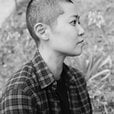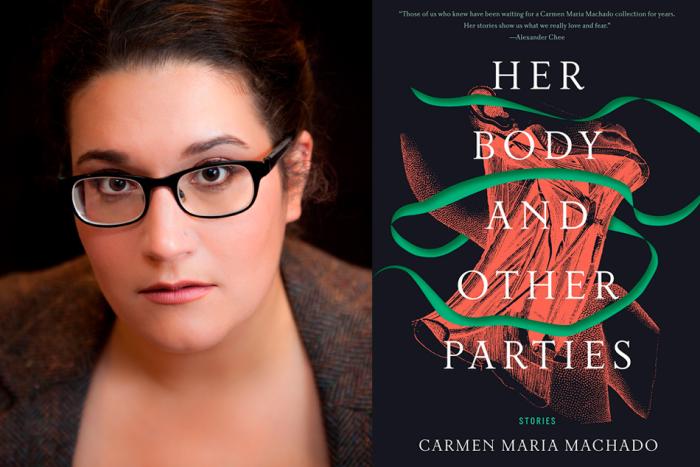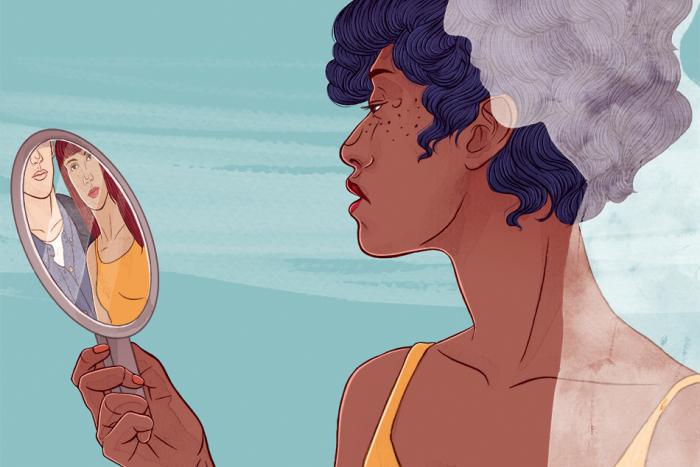What I noticed first was she looked like an alien. Her mouth was full and exaggerated. Her head looked slightly too large for her tiny body. She was beautiful and I was ugly. Back then people took great pleasure in telling me how disgusting I was. I had pimples all over my forehead, coarse black hair, no breasts, and broad shoulders like a man’s. Some days I didn’t want to be alive, but my delusions and curiosity kept me around. I thought that if I loved someone beautiful, I would become beautiful, too. She claimed that she used to be ugly, that the kids in her school called her “dog.” Now she received attention for her appearance and her voice. The voice emanating out of her tiny alien body was deep and smoky. It didn’t seem right that a voice that deep and rich could come out of such a small body. She sounded like she was fifty years old. She sounded like she had been through hell. Come here, I thought I heard her say. I’ll show you how to get through hell.
When I was seventeen years old, I was obsessed with Fiona Apple. This obsession was more real to me than anything or anyone in my actual life. Growing up as a Korean adoptee in the suburbs of Milwaukee I felt distant from my white adoptive parents and my two younger brothers who were also Korean adoptees. My brothers were from different biological families and the three of us looked nothing alike. We were all disgusting in different ways. This was the only beautiful thing about us. The youngest was short and stocky. The middle had a bowl cut and thick glasses. I had back acne, which was so irritated and painful I had to sleep on my stomach. I looked at my family in a detached way, the way a person who dislikes plants would look at plants. For many years, perhaps five to ten, I felt nothing for them, and I reserved all of my joy, happiness, and dread for my obsession with Fiona Apple.
*
The world appears brighter and sharper when you’re in the midst of an obsession. Obsession can feel powerful, overwhelming, and really fucking sad. When you’re obsessed with someone or something, you are almost impossible to locate, you are sucked down into the abyss. It was 1998. I would come across Fiona Apple’s photo in a magazine at a store and start squealing. Then I would tuck the magazine into the waist of my pants, and walk out of the store. When I read mean message board comments about her physical appearance, it felt like an attack on my very own self, and I would go into the bathroom and force myself to puke. I never thought I had an eating disorder because I was skinny. I thought eating disorders were for overweight people. I was so mean and hateful; I had no compassion for anyone. It was a particular form of hell, to feel everything in my life so intensely through the void of this person I would never know.
“Do you think that maybe you are a lesbian?” my mother asked me. She was standing in my teenage bedroom and glancing around at everything. Two Fiona Apple posters were pinned to the walls: one of Fiona Apple in her underwear from the “Criminal” video and the other a giant poster of Fiona Apple gripping a microphone. I was adult enough to admit that from far away the microphone looked like a penis. “Oh my god,” I said to my mother. “I just love Fiona Apple. It’s not about sex or something. She’s really talented. And she’s almost my age.”
My mother looked at me as if I were having a psychotic episode. “Don’t you think you’re talented, too?” What I said about Fiona Apple didn’t make sense to her. I wanted to cry tears of frustration whenever I talked to my mother, because she wasn’t Fiona Apple, and why was she, my mother, this non–Fiona Apple entity, talking to me and wasting my time when I could be imagining talking with Fiona Apple? It was sad. I would rather talk to my idea of a person, a fantasy ghost-person that existed only in my imagination, than talk with my own parents. Throughout this time of obsession, I would casually mention Fiona Apple many times throughout the day as if I knew her, as if we were best friends. Oh, Fiona likes that. Fiona is a vegetarian. That reminds me of Fiona. Fiona’s song. Fiona’s album. Fiona wore that. Fiona said. Fiona’s tour. A picture of Fiona. Fiona Apple riding the subway. Fiona’s OCD. Fiona’s ex-boyfriend is a magician. Fiona’s drugs. Fiona’s sister. Fiona’s real last name.
My mother never understood my obsession. She had never been obsessed with anything in her life, not even a man. She lived plainly, simply, religiously, and she never told lies. It was obvious she thought I was depressed and crazy. She kept asking me if I wanted to talk to a counselor. “It seems like you’re really unhappy, Patty. Are you unhappy? If you talked to a counselor, your mood might improve.” She never said the word therapist. She always utilized the word counselor, as if the counselor were a trusted family friend. The fact that she thought I needed to talk to a counselor because I was depressed and crazy made me even more depressed and crazy. “I don’t need a counselor,” I said to her. “What I need is privacy.”
*
“How can I ask anyone to love me/When all I do is beg to be left alone” –Fiona Apple
My teenage bedroom had a lock on the door and this was very important to me. The lock might have saved my life. Sometimes I would spend hours talking to myself. I would imagine myself starring in a movie with Fiona Apple. We would become best friends. We would fall in love and devour each other; we would live in Los Angeles and do drugs all day. Other hours were spent mindlessly bouncing a NERF ball against the walls. To this day, I have excellent hand-eye coordination. Occasionally I smoked up and listened to Tidal. I wasn’t inhaling properly. I held the smoke in my mouth, then blew it out the window. I burned incense to mask the weed smell. Instead of curtains or blinds, I attached thick beach towels to the window fixtures to blot out the light. My mother would come in during the day while I was at school and rip off the towels, which infuriated me. “It’s like you’re living in a cave,” she would say when I got home. I screamed at her and told her not to touch my things. Whenever I went into my room and noticed the towels had been taken down and folded neatly into small piles on the bed, I was reminded of how a spider works so diligently to spin its web, and then a human being comes along and tears it all away.
Every day I cried. I believed my depression stemmed from my earliest abandonment: being taken to an orphanage the day I was born. According to my orphan file, the first six months of my life I was a mild, nap-loving, bottle-sucking baby. But my life as a Korean orphan, however brief it was, left a traumatic psychic and physical void that no one, not even my fellow Korean-adoptee brothers, could understand. I used to believe that. I saw everything through the eyes of my abyss. One day, I finally agreed to see a therapist and a psychiatrist. I thought the therapist was an idiot, but the psychiatrist had real power, medicinal and prescription-drug power. He left the windows of his office open in the winter. The almost-refrigerated air kept his lunch bag cool on the windowsill. I wore thick sweaters and shivered in the chair as he prescribed Prozac, Xanax, Wellbutrin, Buspar. The effects of the drugs were almost immediate; I became really outgoing and bold. I started to experiment with sex. I told my father I gave a random older man a blowjob. Strange men would call the house at night. “Marquis called for you,” said my father. “Who is Marquis?”
My father said nothing could shock him because he and my mother were medical people. Then my mother chimed in that she, as a nurse working in an emergency room, had removed gizmos from men’s rectums. “I don’t care,” I said. “That’s disgusting. Why are you telling me that?” Then I ran into my bedroom and locked the door. There was a new Rolling Stone magazine with Fiona Apple on the cover. I had stolen it from the grocery store. Fiona Apple is floating in a bluish green pool and her hair whirls around above her head like Medusa. When I looked at photos of Fiona Apple, especially high, an ecstatic feeling of recognition and kinship came over me. She was a genius and misunderstood. Maybe I was a parasite because I used this feeling of kinship to keep myself alive and I did nothing for anyone else.
*
Ten years ago, my youngest brother emailed me. “Where did your book about heroin go? I really liked that book.” He was referring to How to Stop Time: Heroin from A-Z by Ann Marlowe. I remember being startled. I hadn’t thought about that book in years. I don’t remember much about How to Stop Time and I never asked him why he was so interested in reading it again. I told him I sold it to Half Price Books. “Alright,” he wrote. “I’ll buy it myself.” I never thought to ask why he wanted to read that book again. I never asked him anything because questions made him uncomfortable. I knew he lied about everything. He was a slippery person, a real trickster. As the years went on, his stories became more and more outlandish. He was attending the University of Chicago Law School without a college degree thanks to Attorney General Eric Holder’s letter of recommendation. “Do you know Martha Nussbaum?” I wrote to him. “Of course, everyone knows her,” he wrote back. We would see each other a few times a year. His weight was constantly fluctuating. Some visits his body was so thin, I didn’t recognize him. He had to be coaxed into eating. He ate only plain food: white rice, water, pasta. Sometimes he looked like he had gained fifty pounds over the span of a few months, as if he were rapidly acquiring a layer of fat to protect himself from the horrors of the world. He liked to tell this story about me over and over: “Years ago, you fell asleep at Thanksgiving and didn’t talk to anyone. You were really messed up then.”
Before his acceptance into law school, he told my parents he was working out west, training to be a federal investigator, a position that required the utmost secrecy and discretion. “Isn’t that interesting?” my mother said to me on the phone. “He’s working for homeland security.” When I asked for more details, my mother said, “He’s secretive.” There’s a photo of my youngest brother, probably seven or eight years old, wearing a trench coat. He has a magnifying glass held up to his face, making one eye appear monstrously large. In his other hand is an expensive-looking camera, probably my father’s. When he was little he liked to dress up as a detective. That’s what he wanted to be. A detective.
*
My brother lied about many things, but his story about me was true. Some years after my obsession with Fiona Apple, I went to Thanksgiving in Wisconsin coming off of drugs. A woman I was dating gave me a pill, which I thought was a painkiller, and it turned out to be methadone. My relatives hosted Thanksgiving every year at their farmhouse near the border of Minnesota. They were kind people. I was the dark one. I was the void. I spent a couple days at their home locked in the bathroom, vomiting water. Thanksgiving Day I fell asleep on the couch in front of a movie or a football game. My brother was sitting next to me. I believe I said three words to my relatives and my family: “I’m doing fine.”
At that point in my life, I did not identify as a lesbian even though I dated women. I thought lesbian culture was lame. I didn’t want my mother to be right. “I am not a lesbian,” I said to anyone who would listen. Many of the women I dated were ostensibly straight. I was no longer obsessed with Fiona Apple. My obsession had been transferred onto a woman in a seven-year relationship. She and I slept together a couple times and it was and it was stiff, awkward, and disgusting. It was so disgusting I was astonished. How could I be so obsessed with someone who was so bad at sex? Friends asked me that. They were right. But I couldn’t stop myself from calling them in a state of despair to tell them I was about to do something I knew I shouldn’t do. I must have sounded like a sex addict. I vacillated between two extremes: a monastic code of living to fucking anyone who wanted to fuck me. The thing about obsession is the object doesn’t matter. You can be obsessed with flowers, cars, shoes, your dentist, gambling, the NBA, whatever. Obsession is never about the object. Obsession is the yearning and attachment and dread and joy and the abyss. Obsession will always be an attractive fresh hell for a person like me, a person with a longing for attachment, a product of abandonment the day I was born into this grievous world.
Among my collection of photos, there’s one of Fiona Apple from 1998 that I purchased at a CD Warehouse in a Milwaukee plaza. I’ve kept this photo of Fiona Apple with me all these years, moving from Milwaukee to Minneapolis to Milwaukee to Chicago to New York City to Los Angeles. Every time I pack up my things, I consider throwing it away. It makes me think of abject despair and isolation and my teenage bedroom. It makes me think of my life with my brother, watching NBA games in his dark cocoon of a room, avoiding the rest of our family. He preferred Tori Amos to Fiona Apple. We would argue about who was better at Christmas. He loved Tori Amos, which I thought was weird for a man. He was sensitive. No. I will never throw away my Fiona Apple photo.
In 2006, I went to a Fiona Apple show in Milwaukee. I had brought a plastic bag of weed with me, mostly shake. I remembered that in 1999, Fiona Apple stayed at the Hyatt downtown. I don’t know how I knew this, but seven years after I had first acquired that knowledge, I decided to ride my bike there after her show. Her tour bus was parked in front of the hotel entrance. Fiona Apple was standing outside of it, hugging her bandmates, teary-eyed. It was the last show of her tour. I waited, and when there was an opening, I approached her. I imagined we would go onto her tour bus and smoke up together. Possibly we would have a deep conversation in which we revealed all of our hopes and fears. We would understand each other, I was certain. As I approached her, a look of confusion came across her face. It became obvious she wondered what I was doing, and why I was there. I held up the bag of weed in front of her face. “Do you want this?” I said. Our interaction ended when she took my shitty bag of weed onto the bus. The door closed.
*
It was difficult to talk about my obsessions with my brother, but I think he understood. Of course I learned later on that he had his own obsessions and struggles. In fact, it could be said he too was driven by obsession, that his code of living was informed by obsession and generosity and self-deletion. I never asked him about it. It was the kind thing to do, to leave him alone and to respect his privacy, to respect the lock on his door. Almost ten years ago, my brother drove his car from Milwaukee to my bullet-ridden apartment building in a rough part of Minneapolis. My rent was $400 including utilities. There was a layer of dark green paint underneath a thin coating of beige, some of the paint flaking and chipped, which imparted a sick hopelessness. He brought a few rolls of paper towels and a bottle of Windex and he helped me clean my piece-of-shit apartment. On a shelf there was a bag of weed and a glass bowl. He didn’t comment. He lifted up my TV/VCR combo and carried it out to the car. I was moving into a studio apartment in Milwaukee because I was done with Minneapolis.
Living in that shit hole, I came to understand slowly that I had abandoned myself. I decided it was time to run away from my obsession and disappointment. The first part of my life was informed by it, I was determined to give it up, and a fresh start in a new city was just what I needed. My brother drove the car to Milwaukee and paid for the gas. He was always very helpful. I’ll never forget that. Everyone in my family believed he would be a successful lawyer one day. Everyone loves to believe lies that are beautiful and generous. “I’m going to help you financially,” he had said to me. “You won’t have to worry. One day, I’m going to make at least $150,000 a year, and I won’t need all of it.” When he said that, I think even he believed it. And the truth is, I never did one thing for him.
A few years ago, he reached out to me one night through an email. I was in Brooklyn, walking with my partner at the time down 7th Ave in Park Slope at night. People rushed past us on their errands. I re-read his email on my phone at least three times; I could tell something was wrong. I stopped in the middle of the sidewalk. “This email from my brother is really weird,” I said. Then I put my phone away. I didn’t respond. We continued walking. I was so exhausted from working full-time in New York City, I told myself, “Tomorrow or the next day or maybe next week I will write back to him.” I never did. To this day, I feel a sense of shame for being such a self-absorbed parasite caught up in numerous tiny dramas that meant nothing to me or to anyone. I was too busy to write back to him, I decided, he would understand. But what kind of monstrous human being doesn’t respond to an email like that? I kept saying to myself, “I will. I’ll do it soon.” In the end, it didn’t matter, and a few days after he sent his email, there was no longer a person to write back to.






